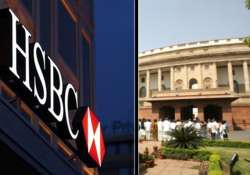Income Tax Crackdown On MPs, Industrialists Having Accounts In HSBC Bank, Geneva
New Delhi, Nov 1: The Income Tax department is reported to have launched a crackdown on undisclosed account holders who have parked their money in HSBC Bank, Geneva.In a first of its kind crackdown against

New Delhi, Nov 1: The Income Tax department is reported to have launched a crackdown on undisclosed account holders who have parked their money in HSBC Bank, Geneva.
In a first of its kind crackdown against those stashing unaccounted wealth overseas, the department has launched an offensive against politicians and industrialists who had parked money in HSBC Bank, Geneva, a Times of India report said.
Under pressure to act against black money and money laundering, the tax department has conducted at least 50 searches over the last two months.
The move follows receipts of details regarding 700 bank accounts from the French government.
The list of those under the lens includes a top Mumbai-based industrialist who during questioning admitted to having family accounts in HSBC, Geneva with deposits totaling more than Rs 800 crore.
Summons have also been issued to three Members of Parliament (MPs) from Haryana, Uttar Pradesh and Kerala to appear for questioning at the Delhi office of I-T department's recently-set up Directorate of Criminal Investigation (DCI).
The MPs would be asked to explain the source of funds in the Geneva accounts.
In addition, recovery of over Rs 300 crore has already been made from several evaders, although some of those whose names figured on the list have refused to admit to having Swiss bank accounts.
But unwilling to give up in the face of mounting scrutiny from the courts, the tax department is also making enquiries overseas to get details of nearly 300 cases of undisclosed wealth.
A senior finance ministry official told TOI that looking at the gravity of the cases and their overall impact, the government has handed over the entire investigation to the Delhi office of DCI. This will also help prosecute those accused of parking black money in tax havens.
Unlike Liechtenstein, where the tax department levied penalties amounting to around around Rs 25 crore against some 18 persons whose names were shared by German authorities, this time the government intends to invoke stringent provisions of the I-T Act to set a precedent.
This could mean that those found guilty of evasion could not just face monetary penalty but also end up spending between five and ten years behind bars.
As part of the assault on tax evasion and money laundering, the government has asked the Central Board of Direct Taxes ( CBDT) to disallow any compounding of penalty and instead go for prosecuting the accused, something the I-T department had fought shy of in the past.
So far, the accused were only tried under Prevention of Corruption Act, and even that was limited to public servants. The I-T Act was merely treated as civil law and tax evaders were let off after they coughed up penalty.
Besides these account details, the Income Tax is in possession of nearly 10,000 pieces of information on high-value suspicious transactions undertaken by Indians overseas.
Investigations have started in all these cases and references have also been made to enforcement agencies abroad to seek more details.